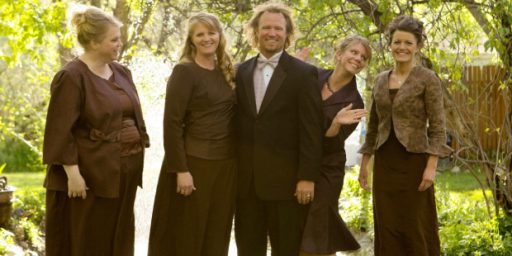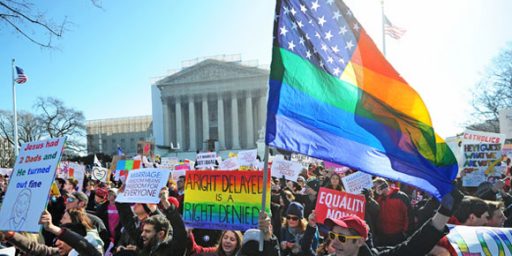GAY MARRIAGE, REDUX
Newsweek has a cover story entitled, “The War Over Gay Marriage” which reflects on the potential impact of the Supreme Court’s far-reaching opinion in the Texas sodomy case.
Justice Kennedy’s ruling in the Lawrence case “may be one of the two most important opinions of the last 100 years,†says David Garrow, legal scholar at Emory University and Pulitzer Prize-winning biographer of Martin Luther King Jr. “It’s the most libertarian majority opinion ever issued by the Supreme Court. It’s arguably bigger than Roe v. Wade,†said Garrow, referring to the 1973 Supreme Court decision giving women a right to abortion. At least in symbolic terms, Garrow put the decision on a par with Brown v. Board of Education, the landmark 1954 ruling declaring that separate was not equal in the nation’s public schools.
The difference, of course, being that Brown was at least consistent with the plain meaning of the 14th Amendment.
While noting that Justice Scalia and many Christian conservatives are furious about the ruling, the authors think their fears overstated:
While gays can now claim some constitutional protection—their new right to privacy under the Lawrence decision—the federal government and the states can override those rights if they have a good enough reason, a “legitimate state interest.â€
Granting that this Court has shown no tendency towards consistency, it would be hard to come up with a rational basis for denying homosexual marriage that was any more compelling than denying homosexual sodomy.







I am still in the process of digesting this case, but it would seem that since the predicate of the recent ruling is privacy, then there is an argument that marriage is a public act, rather than a private one. I am not saying that the Court would necessarily see it that way, I think it is possible. Had they gone with the more logical equal protection argument, then I could see no legal way to bar gay marriage.
Having said all of that, I would be surprised if the current Court would block gay marriage.
Yep–especially in light of Friday’s ruling on the homosexual rape case, which seemingly relied on the equal protection argument.
I really find the Equal Protection argument compelling, but am at a loss for the Due Process argument Kennedy made. Further, it would seem that an Equal Protection argument wouldn’t require the invocation of the privacy argument.
Yep all around.
I tend to construe the Constitution in accordance with the intentions of the Framers/Amenders in mind and it seems obvious to me that they didn’t intend to legally protect homosexuality when the 14th Amendment was added. Still, it is arguably there is terms of the plain meaning of the Amendment as written.
I’d be very surprised if the current court, or any other, were to “block” gay marriage; even Scalia wouldn’t do that. Whether they will mandate gay marriage, that’s a tougher question. Judging by the weird rulings of their final week this term, I think the answer is definitely “maybe.”
Xrlq: I think you’re right. Clearly, a state would be within its rights to allow gay marriages. Now, whether the Full Faith and Credit Clause would then require other states to recognize these unions is another matter. And, while I don’t know if the Court would mandate gay marriage, they might preclude discrimination based on gender in marriage–which would amount to the same thing, except that states could just abolish marriage altogether.
—